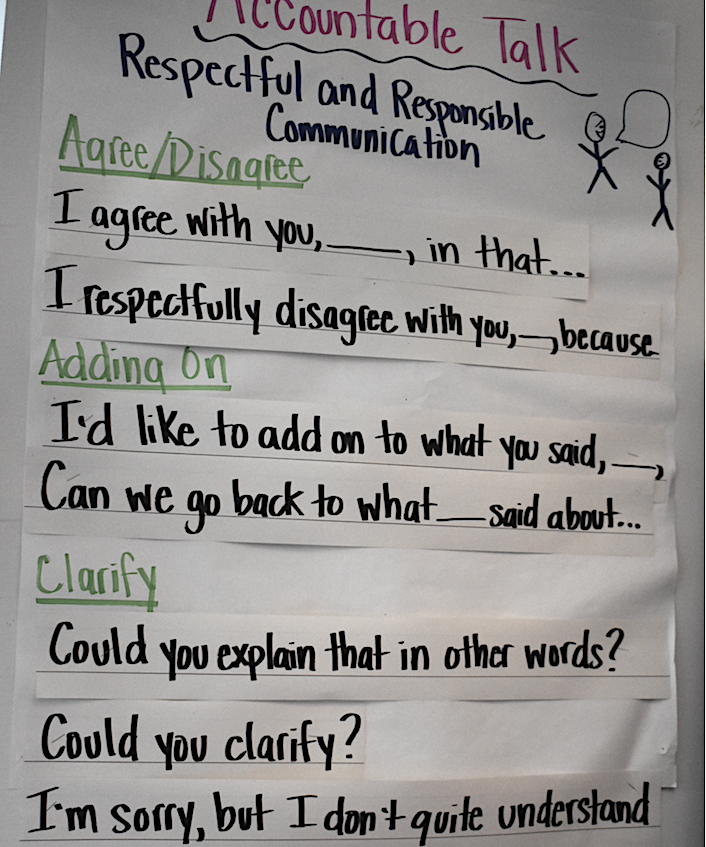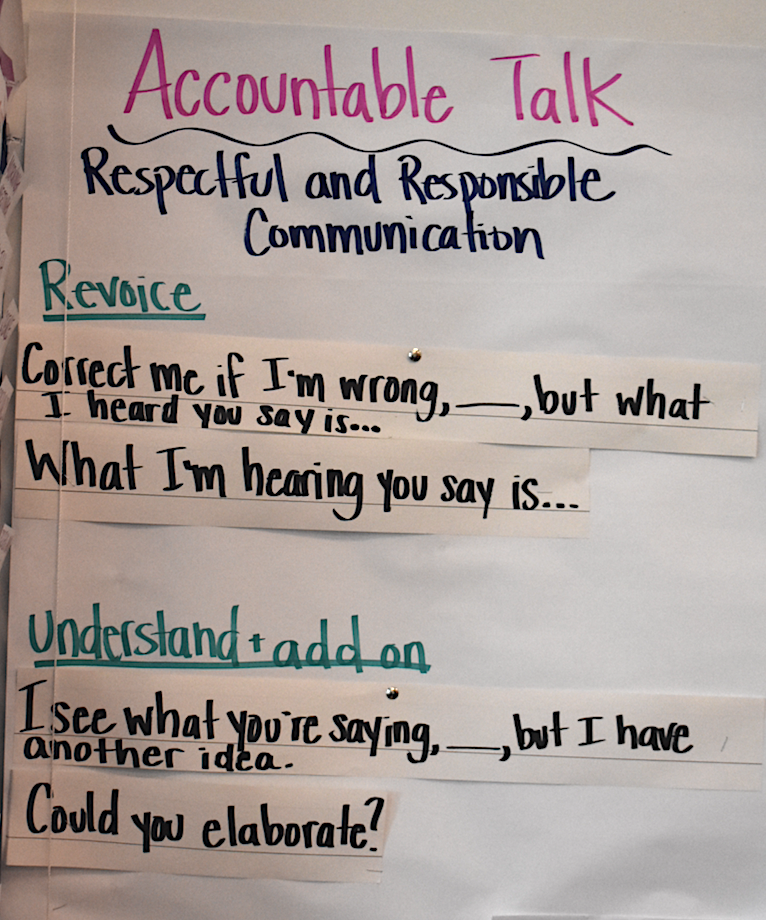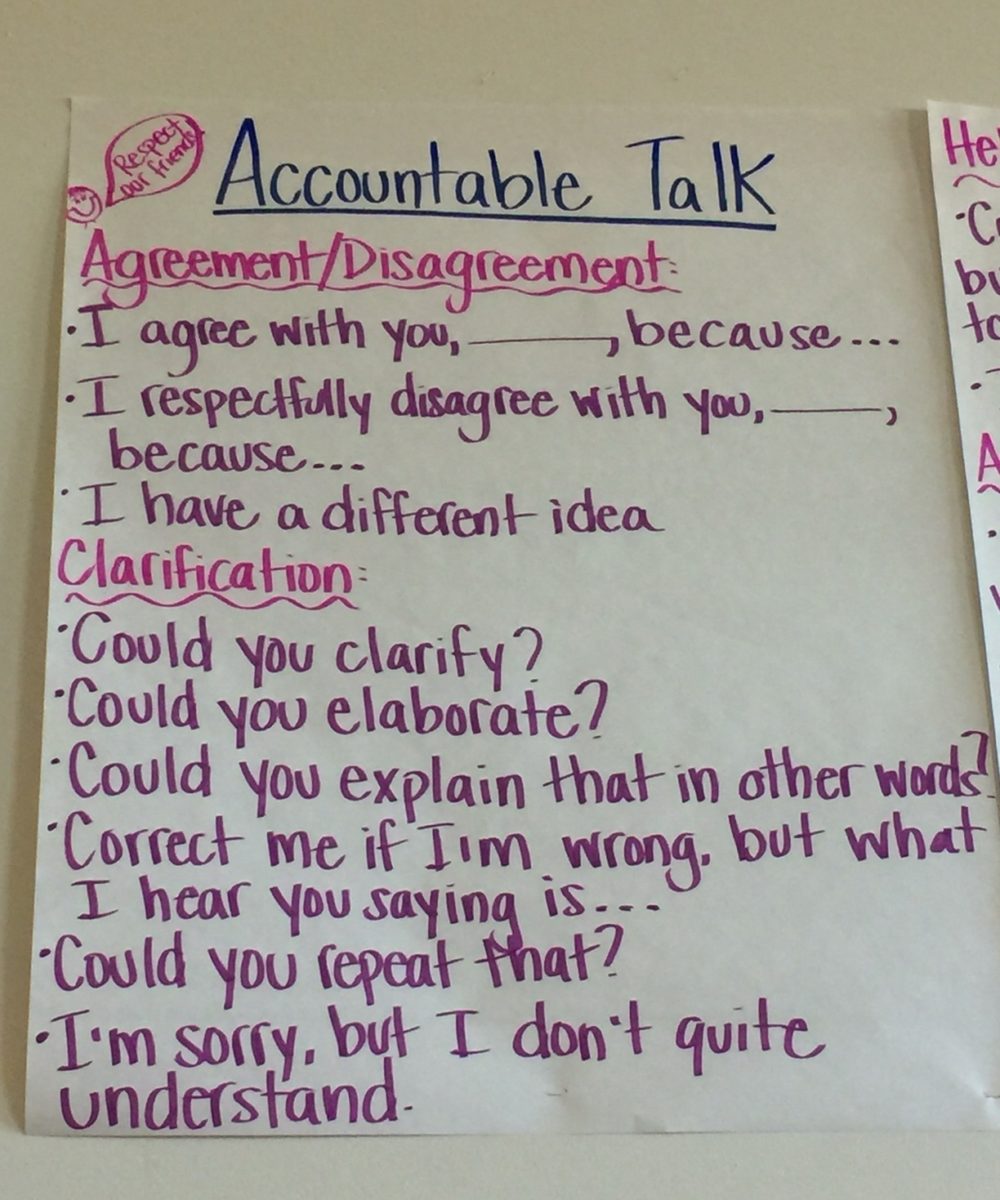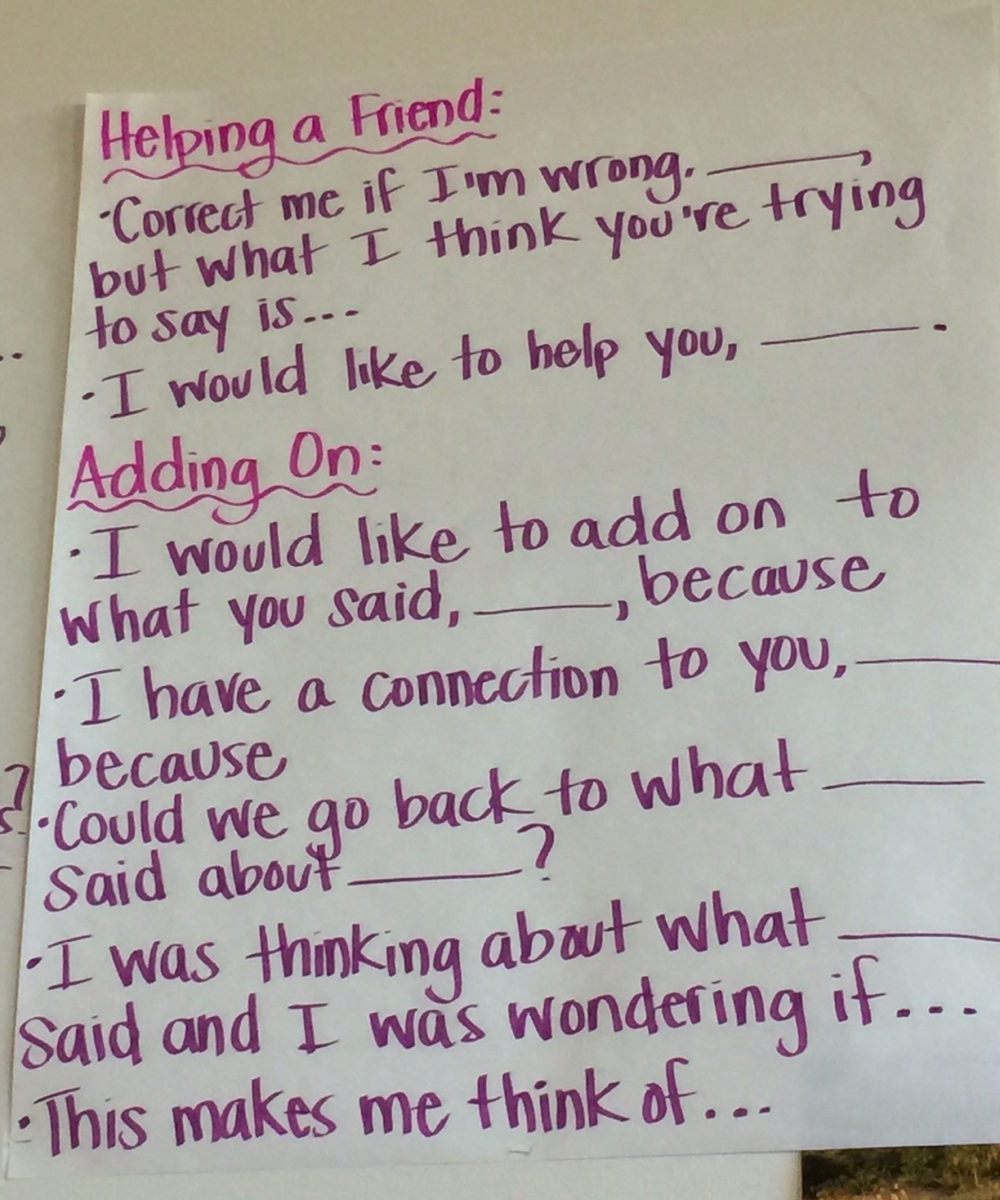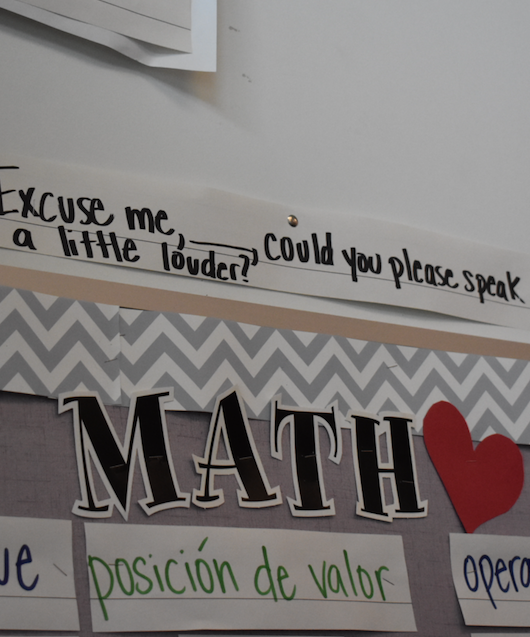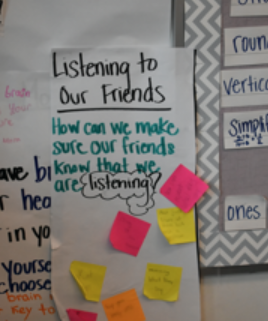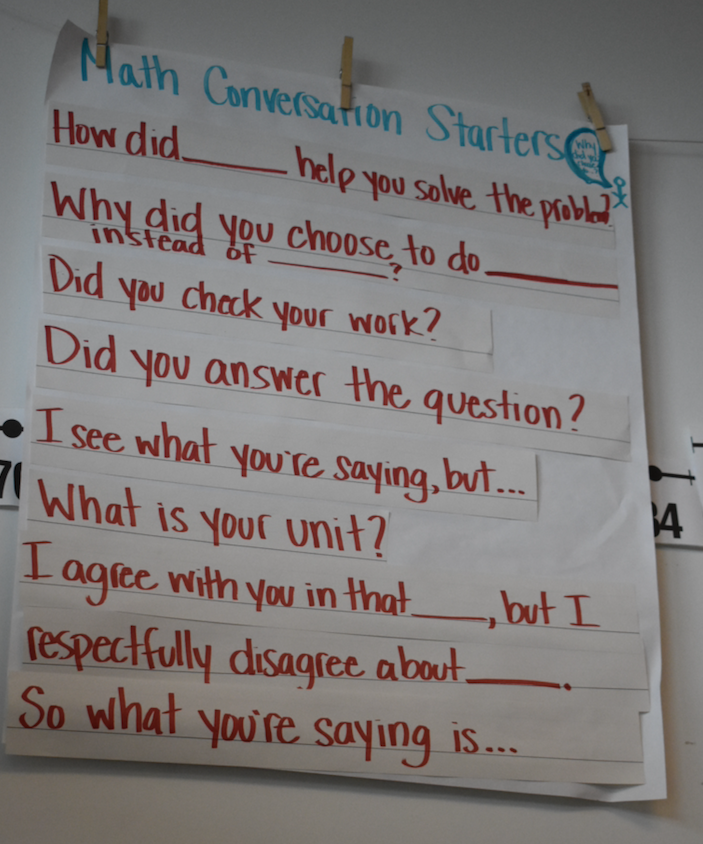This course for K-6 educators explores the power of student reflective journals in building students’ mathematical knowledge and practices.
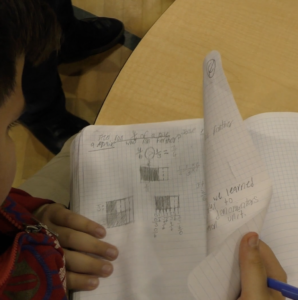
Session 1: Explore the Inquiry Topic & Reflect on Your Current Practice
Outside-of-class meeting | Time: 1 hour | Materials: Recent Student Journals (class set) and board photographs for several recent lessons
Focus
Allowing students time to independently record their thinking, prior to speaking and listening, sharpens each partner’s contribution to the conversation and provides a visual reference (with diagrams, expressions, etc.) students can use to justify their thinking to others. Talking about their ideas helps students to write. Writing about their ideas helps students to talk.
1A: Reflect on Your Current Practice
- Jot it down. What do you currently do to support your students to explain their mathematical ideas and listen to the ideas of others?
- Examine your students’ journals. What is the evidence that speaking and listening support students’ journal writing? For example, do the journals provide evidence that students notice and think about classmates’ ideas?
- Reflect on how and when students spontaneously use their journals in your classroom. Do students use their journals to explain their thinking–for example, when trying to convince a partner or presenting their work at the board? Do they flip back in their journals to consult earlier lessons, when trying to understand something in a class discussion? Do they actively consult each other’s journals when trying to understand each other’s explanations, for example in a partner chat?
1B: Learn about New Strategies
Here are some strategies that educators use to help students build their speaking and listening skills:
- Sentence stems to support speaking, listening and writing.
- Students use their journal writing to support them as they present their work to a partner or to the class.
- Students use prior journal entries as a resource for class discussion or writing
1C: Plan to Try New Strategies
What specific changes do you plan to make in your classroom use of journals to help support your students to explain their mathematical ideas and listen to the ideas of others?
- Note down the specific strategies you will try out over the next week (or next 3-5 lessons that use journals)
- Note down the evidence will you look for, in journals or in the classroom, to gauge the impact of these strategies
Session 2: Try New Strategies in Your Classroom
In class | Time: 3-5 lessons over 1 to 2 weeks
- For the next week (or approximately 3-5 lessons in which journals are being used), try out the strategies that you identified to support your students to explain their mathematical ideas and listen to the ideas of others
- If possible, jot down after each lesson your experiences and observations related to the strategy that you tried
- Prepare for the next session by collecting your notes and your students’ journals
Session 3: Examine Evidence and Refine Your Plan
Outside-of-class meeting | Time: 30-60 minutes
3A: Examine Evidence from Lessons and Revise Plan
Examine student journal entries and read through any notes you jotted down as you were working to strengthen beneficial connections among speaking, listening and writing.
Reflect on (or discuss) the following questions:
- What do you notice in students’ journals, or find in your notes, that connects speaking and listening with writing? For example, does student writing capture ideas students heard during partner talks or class discussion? Do your notes indicate that students used their journals to support presentation of ideas at the board or to peers? Did you notice students draw on each other’s journals or their own prior journal entries?
- What strategies were successful, and what did you find challenging, as you tried to build stronger connections between speaking, listening and writing?
- What strategies would you like to carry with you in your next week of instruction and what refinements, if any, might you make, to enhance benefits to your students?
- What new strategy would you like to test our in the next week?
Feel free to work further on the strategy you have tried and/or to choose a new strategy, depending on what you think will have the greatest pay-off for your own learning and for your students.
3B: Make a Plan for Your Second Round
- Note the specific changes you will try out in your classroom use of journals to further strengthen the connections between speaking, listening and writing
- Note the evidence will you look for to help you assess the impact of your work
Session 4: Test Your Refined Approach
In class | Time: 3-5 lessons over 1 to 2 weeks
For the next week (or approximately 3-5 lessons that use in which journals are being used), try out the refined strategies that you believe will further strengthen the connection of speaking, listening and writing in your mathematics classroom.- Try out the strategies for approximately 3-5 lessons in which journals are being used (about 1-2 weeks)
- If possible, jot down notes during or soon after each lesson to capture your experiences and observations related to the strategies that you tried
- Bring your notes and your students’ journals to the next session
Session 5: Examine Evidence and Reflect on this Inquiry Cycle
Outside-of-class meeting | Time: 30-60 minutes
5A: Examine Evidence and Reflect
Examine student journal entries and read through any notes you kept as you were working to build connections among speaking, listening and writing. Reflect on (or discuss) the following questions:- What do you notice in students’ journals, or find in your notes, that connects speaking and listening with writing? For example, does student writing capture ideas students heard during partner talks or class discussion? Do your notes indicate that students used their journals to support presentation of ideas at the board or to peers? Did you notice students draw on each other’s journals or their own prior journal entries?
- What was successful and what was challenging as you worked to build stronger connections among listening, speaking and writing?
- What strategies would you like to carry with you into your future instruction, and how would you like to modify these strategies (if at all)?
- What new strategy would you like to try?
5B: Reflect on this Inquiry Cycle
- What did you learn that might inform future inquiries–for example, how to collect data, collaborate, find useful resources, etc.
- Is there anything from this inquiry you would like to share more broadly at your school or with the profession? How will you do this?

